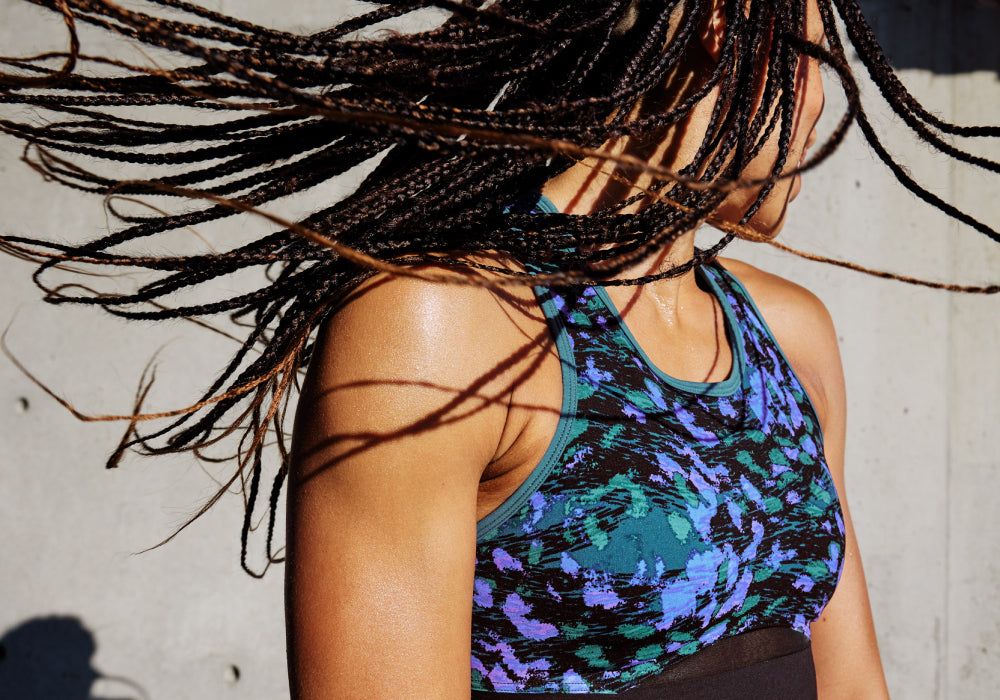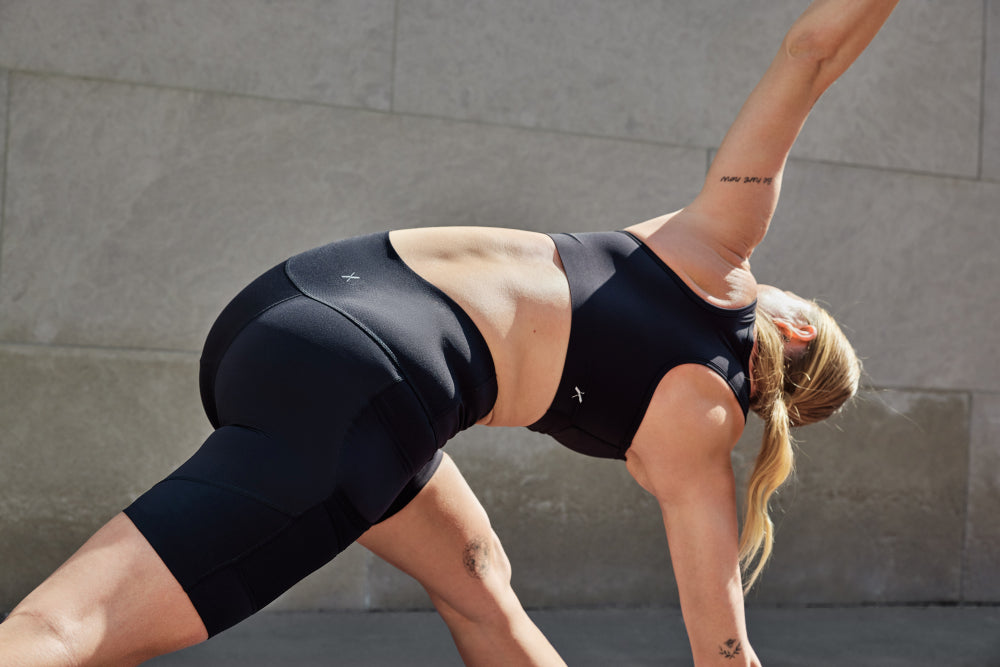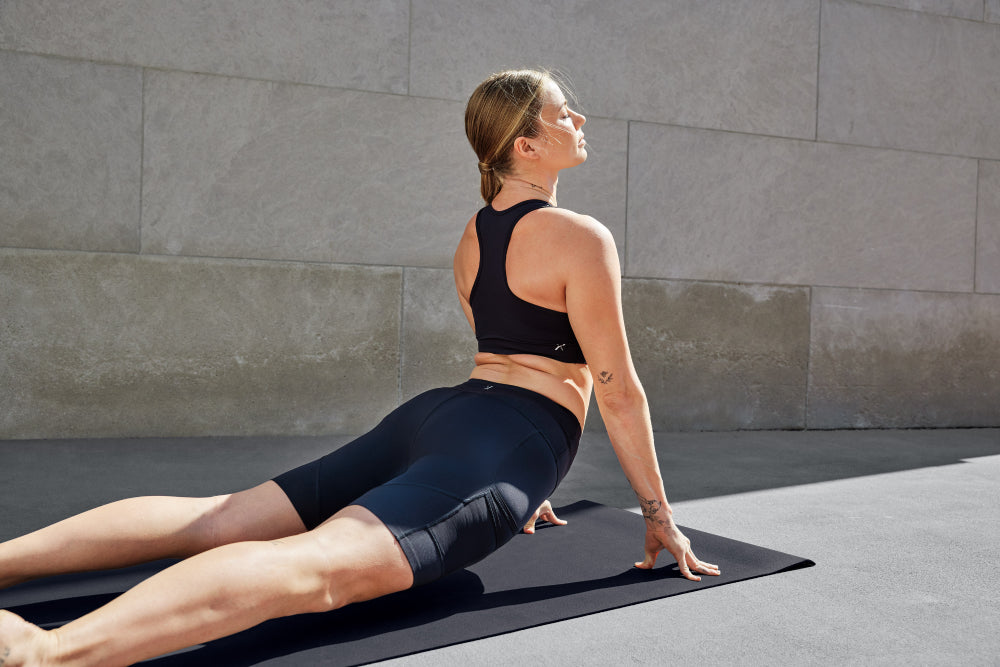Finding Body Harmony: How to Adapt Your Period Workout Routine

Ayurveda is an alternative medicine philosophy that was developed more than 5000 years ago in India. Translated, it means the “Science of Life” and is rooted in the balance and connection between mind, body, spirit, and environment when it comes to health and healing.
When it comes to the menstrual cycle, Ayurveda has many deep and rich philosophies around understanding and caring for your body including naming the menstrual phase, the “inner winter.”
What this is trying to encourage is that your period can be a time for hibernation, rest, reflection, and meditation. Because you may feel extra sensitive or delicate during this time (due to menstrual cramps and other period symptoms), your period can be an opportunity to turn your energy inward.
As the cycle syncing movement gains popularity, more than ever, people with periods are connecting with their unique needs—adapting the way they work, eat, and move to be more attuned with their hormonal cycles.
People with periods, just like you, are arming themselves with the awareness, skills, and confidence to tap into and honor their bodies' authentic needs. They are tracking their hormones, taking their paid menstrual leave, and swapping out disposable period products for safe and sustainable products like period underwear and menstrual cups.
Overall what this movement has taught all of us is how to honor our “inner winter” in the hopes of improving our relationship with our bodies and cycles as a whole. This can include exercising during your period, and adapting physical activity in a way that supports and nurtures your vessel.
So, whether your body is yearning for a gentle stretch or aerobic exercise, these helpful tools can help you tune in and make exercising during your period a more harmonious experience.
Reframe Your Mindset Around Physical Activity
Your menstrual phase is a delicate dance of hormones.
During the four phases of your hormonal cycle (menstrual, follicular, ovulatory, and luteal), four main hormones (estrogen, progesterone, follicle stimulating hormones, and the luteinizing hormone) are continuously rising and falling.
During your perid, your progesterone and estrogen levels drop, your uterine lining starts to shed, and your period starts—and so do undesirable period and PMS symptoms like menstrual cramps, low energy levels, bloating, period pain, and breast tenderness that we all know (but definitely don't love).
These hormone changes—and associated period symptoms—are why you may not feel up for rigorous, intense physical activity. In fact, you may find that menstrual pain means that exercising during your period is totally off the table.
And that is absolutely ok.
The reason it may not feel ok (yet) is because dominant workout culture is often focused on punishment and reward—no pain, no gain, right?
Think about the language we so often hear in workout classes or in fitness routine scenes from our favorite TV shows, which often go something like this:
Push yourself, go harder, faster, keep going, don't quit, you can do this.
When trying to cultivate a workout routine that feels more attuned to your body's needs (and less focused on pushing yourself to your limits), it can be challenging to unlearn this pop culture rhetoric. The key is reframing your mindset around movement and taking the time to define for yourself what makes for a great workout.
How you define great might be subject to change, too. Great can look different at different times.
Ultimately, choosing how to engage with movement based on what feels best and most restorative for your body during your period (or on any given day) is our definition of a great workout.
Listen to Your Body
 There is an art to listening to your body.
There is an art to listening to your body.
Your body is extremely wise and can give you insights into how you can best take care of it during your menstrual cycle and all other phases.
Listening to your body can look like tuning into different sensations, feelings, or finding areas of tension or ease. For example, during your period your body could feel more sore, heavy, or tired especially in certain areas or during different times of day.
Once you have an understanding of what your body is feeling, you can adapt your movement practice based on what you think it may need.
Is your body feeling stiff? Consider heading a yoga class. Is your body feeling anxious? Think of going for a walk or a hike. Is your body feeling exhausted? Then maybe just skip the workout altogether and choose to take a nap, bath, get a massage, or another body related self care activity you enjoy.
While adjusting (or skipping!) your workout during your period may make you feel like you're falling off your routine or not hitting your fitness goals, there are studies that show it may actually be beneficial.
For instance, some coaches and athletes have adjusted training based on hormonal phases and fluctuations to favorable outcomes.
When it comes to cycle syncing your movement sessions, this could look like doing your most intense workouts during your ovulatory phase (when energy is likely to be higher), while reserving more gentle movement for your menstrual or premenstrual phase (when you're more likely to experience fatigue).
Find Comfort During Your Menstrual Cycle

During your period, you may not be feeling your best. And even once you've reframed your mindset and listened to your body's unique needs, the notion of donning uncomfortable workout clothes might be enough to deter you from doing any movement at all.
For days when you can't be bothered to wear a pad under your leggings or go for a run with a tampon in, there's period-proof activewear with built-in absorbency. Whether you have lighter periods or a heavier flow, Leakproof Leggings absorb around 3 to 5 super tampons worth of liquid (blood flow, sweat, pee—you name it).
Comfortable and confidence-boosting, they're designed for solo use (no extra period products needed) and to be worn commando. Find yourself a breathable tank or high impact sports bra, and suddenly you have a matching set that feels easy to slip into—whatever part of your cycle you're in.
Opt for Lower Intensity Workouts, Like Aerobic Exercise
 When in doubt, stretch it out.
When in doubt, stretch it out.
If you're feeling unsure about what kind of movement practice you want to cultivate during your different phases or menstrual cycle, a good starting point is choosing exercise that's lighter, easier, and lower intensity.
These more gentle forms of movement may put less strain or demand on your body when you might be experiencing period cramps or yearning for rest. Lower intensity exercise to try during your period include:
- Yoga poses
- Light walking or hiking
- Bike riding
- Swimming
- Dancing
- Aerobics
- Light cardio
The benefits of this type of physical activity is it also supports what your body wants to do most during this phase: recover. There's also research to suggest that engaging in movement—like regular aerobic exercise or even breathing exercises—during your period can help reduce menstrual pain.
During this phase, adapting your exercise routine to your period can also mean choosing the best kind of exercise to nurture, harmonize, and flow with your body. Higher intensity workouts, on the other hand, can often be best suited to your ovulation or follicular phase.
Whether you're a couch potato or a gym baddie during your period, there are no wrong answers—there's just tuning into your body and its distinct needs.
—
We hope you found this post informative — but remember: we’re not doctors and this post is not medical advice! While all posts are fact-checked and well researched, we always recommend you chat with your doctor about any questions or concerns you might have regarding a medical condition.
We’re here to support and educate, but never with the aim of disregarding professional medical advice you’ve been given. Phew, now that that’s out of the way, you can go on living unapologetically free.











